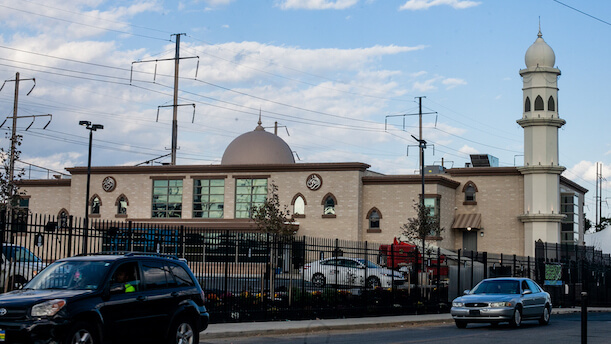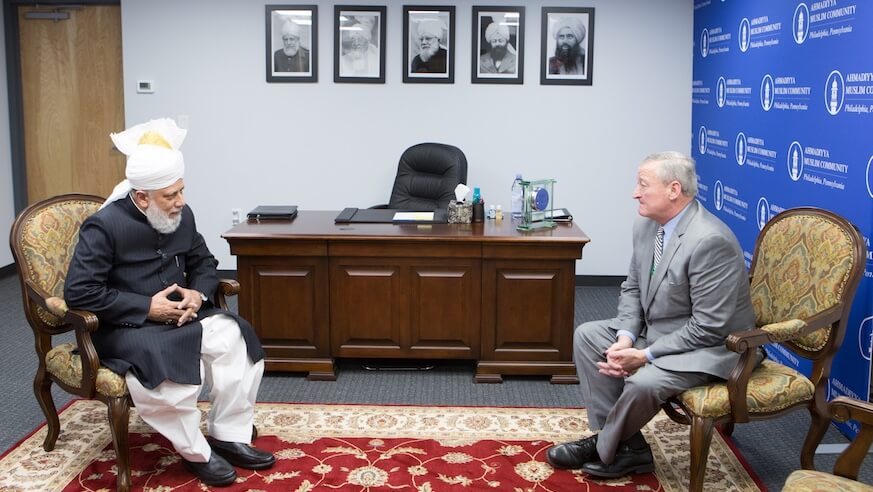A spiritual leader to some 20 million Muslims was in North Philadelphia recently for a rare occasion: the opening of a new mosque on Glenwood Avenue off Broad Street, just around the corner from Joe Frazier’s gym, built from the ground up on what just years ago was a barren piece of vacant land.
With a traditional Islamic exterior design that brings a sense of Mecca to North Philly, a 55-foot minaret, and decked out inside with brand-new facilities and pristine prayer rooms, the $7 million Baitul Affiyat mosque’s opening was attended by hundreds of the faithful who came to see His Holiness Mirza Masroor Ahmad, the fifth Khalifa of Ahmaddiya Islam.
“From this building, only a message of love, affection and brotherhood will shine forth,” Ahmad told attendees of an Oct. 19 ceremony attended by Ahmadi Muslims, local elected officials, and the media.
Speaking simply and quietly, Ahmad described Islam as a faith emphasizing non-violence, tolerance, and empathy with all others as he fielded questions from media, including inquiries as to whether he had tried a cheesesteak while visiting Philadelphia.
With a tradition of service events and community support (like an annual blood drive commemorating 9/11, and the Philadelphia Ahmaddiya Society’s support for local Jews whose cemetery was vandalized) and a multiracial membership, the faith embodies liberal ideals of tolerance that many Philadelphians endorse.
“I think that God sent this mosque to this neighborhood and to this city,” Mayor Jim Kenney said during the Oct. 19 ceremony. “I really do believe that the things that we are struggling with, the difficulties we are struggling with, can be helped by positive people and positive role models who show our children the right way.”
In Philly, an estimated 200,000 people are Muslims — 15 percent of the population — and some 47 registered mosques exist, with many more existing informally. Including suburban counties, the Muslim population of Southeastern Pennsylvania is made up of about 500,000 people.
But out of an estimated 1.6 billion Muslims worldwide, even 20 million Ahmadis is but a fraction. The barely century-old sect is based on the teachings of founder Mirza Ghulam Ahmad, an Indian mystic who identified himself as a Messiah and prophet. Ahmadis describe their founder as reformer, but nonetheless, their spiritual lineage has created some division between Ahmadis and so-called “mainstream” Muslims, who see the Ahmadi founder’s claims as detracting from the stature of Muhammed as the last Islamic prophet.
“There are differences in regards to theology between the two, and theological differences sometimes translate into disagreements in other walks of life as well,” explained Dr. Ahmet Selim Tekelioglu, Outreach and Education Director for CAIR-Philadelphia. “The majority of Muslims consider Ahmadis an unorthodox movement, and some call it a heretic sect.”
Abroad, this discord has at times been violent, with some Ahmadis persecuted and even murdered for their faith in some places. In 2010, terrorist bombings at Ahmadi mosques during Friday prayers in Lahore, Pakistan killed 86 and injured dozens. In Pakistan, it is against the law for Ahmadis to identify themselves as Muslims.
“Other Muslims, when they call us non-Muslims, we just pray for them, because we know they don’t have the inner knowledge of Islam: Islam is about peace, tolerance, love for humanity, ‘love for all, hatred for none,’ this is Islam,” said Mujeeb Chaudhary, president of the Philadelphia Ahmaddiya Society. “We, the Ahmadiyya Muslim community, believe the same thing which all the Muslims believe, and that is that there is no one worthy of worship except Allah, and Mohammed is his messenger. That is the common ground for all Muslims.”
Regardless of differences between Muslim sects, the Ahmadis are here to stay. An early Muslim missionary to the U.S. was the Ahmadi Mufti Muhammad Sadiq, a companion of the original Ahmadi founder, who arrived in Philadelphia and successfully negotiated with immigration authorities to allow the domestic teaching of Islam.
Since 1960, the Philadelphia Ahmadiyya Society has had a presence in Philadelphia, starting at a small storefront in South Philadelphia, and moving to West Philly in 1972, before opening a small mosque in 1982 on North 10th Street. After fundraising since 2003, and buying a vacant lot that was formerly used as a tire dumping ground, the completion of the mosque represents the attainment of a long-held dream for the nearly 1,000 Ahmadis residing in the Philly area.
“The Philadelphia Muslim community is very diverse,” said Dr. Tekelioglu, who stressed that CAIR will provide services and assistance to anyone who faces instances of religious discrimination, as anti-Muslim racists do not differentiate between sects and have even targeted non-Muslims like Sikhs. “The Ahmadi community is part of that broad spectrum and has been historically instrumental in the spread of Islam in America, especially in the 1930s and 1940s, including in Pennsylvania. Of course, theologically speaking, many Muslims dispute including them in the fold of Islam but then again — like I said, the community is very diverse in and of itself, and it is a richness in my opinion, that there is a diversity.”




























